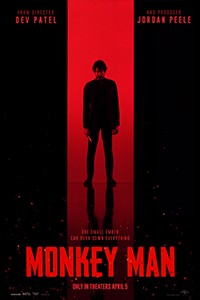
Monkey Man
By Brian Eggert |
In Monkey Man, Dev Patel rethinks the Hindu god Hanuman into a gritty modern-day fable about class, politics, and brutal hand-to-hand combat. The subject of epic poems and various legends, Hanuman is a monkey deity associated with heroism, martial arts, and a focused commitment to noble causes. Patel, credited with the screen story and as co-writer, producer, and director, also stars in this work of blistering action and breakneck pacing. He casts himself as an almost posthuman figure, a street fighter who rises from the slums to become an avenger of sorts, imbued with a borderline superhuman drive to stop the political essentialists who have wronged him and so many others on his low rung of India’s social ladder. While steeped in Hinduism and wall-to-wall allusions to epic narratives, the film also resembles a Hollywood revenge thriller. The titular hero is less a divine figure than an extremist hero like Dirty Harry, The Dark Knight under Frank Miller, and The Bride from the Kill Bill movies, exacting bloody vengeance on the deserving for the entertainment of the masses. Though Monkey Man seems delighted in purveying elaborate, stylish action scenes, they’re enriched with Hindu symbolism and sociopolitical commentary.
Making his debut behind the camera, Patel channels director Danny Boyle, helmer of Patel’s breakthrough role in Slumdog Millionaire in 2008. Boyle’s kinetic energy, penchant for propulsive music, and urgent camerawork have rubbed off on Patel, who confidently imitates the director’s signature aesthetic. But Patel has grown up since first playing a young man who rose from the Mumbai streets to win on a popular game show, and he’s developed into a skilled performer of incredible range, as evidenced in dark stories such as The Wedding Guest (2018) and literary protagonists from David Copperfield to Sir Gawain. Writing alongside Paul Angunawela and John Collee, Patel conceives a sore-knuckle movie in the spirit of John Wick and its sequels, albeit layered with a touch of social justice and humanism those films lack. However, John Wick’s war on the hitman underworld began when goons killed his dog—a fitting reason. In Monkey Man, Patel’s character, credited as Kid, helps and trains a stray puppy during one sequence. But after the animal serves her purpose and delivers a gun to him, the puppy disappears. With over an hour left, good luck thinking of anything except, “Where’d that puppy go?”
In the dank, putrid-looking underground fight club known as the Tiger’s Temple, run by a shady announcer (Sharlto Copley, in a typically bombastic performance), Kid serves as the monkey-masked fall guy, intended to drop at the hands of crowd-favorite fighters with Jungle Book names like Baloo and Shere Khan. Beset by fiery memories of his traumatic past, where police official Rana (Sikandar Kher) raided his idyllic forest village as a child, killing his mother, Kid makes a haphazard leap at revenge. He talks his way into a lowly job working for Queenie (Ashwini Kalsekar), the no-nonsense madam of a private club that caters to an inner circle of shady types who delight in drugs, sex workers, and LED lighting. Aided by an occasional sidekick (Pitobash), Kid intends to kill Rana but hesitates, leading to a deliriously staged bout in a restroom, rivaling those of True Lies (1994) and Mission: Impossible – Fallout (2018). Kid’s ultimate target is Rana’s boss, Baba Shakti (Makarand Deshpande), the power behind a Sovereign party candidate masquerading as a bastion of spiritual goodwill. But the villain’s seeming benevolence conceals his association with crime, drugs, police corruption, and sex trafficking.
 Without question, Patel critiques Hindu nationalist politicians such as Narendra Modi, a persecutor of religious minorities and critics in the media. Like many contemporary far-right politicians, from Donald Trump to Giorgia Meloni, Baba Shakti resists pluralism and uses his fundamentalism to claim he has the people’s best interests in mind. Yet, he inhabits a skyscraper marked by a golden crown emblem, and from his window high in the skyline, he can look down at the shanty towns below. Besides these apparent symbols of class division in Mumbai, Patel’s direction injects glimpses of life on the streets. When there’s a car chase, the director frames shots with homeless people in the foreground. These sights are momentary details, never dwelt upon but inextricable from the environment, and the violence often distracts from their inclusion. Take a fight sequence that spills into a grimy brothel, where Kid wrestles with an axe-wielding pimp before biting off his nose. Patel includes a moment that shows a small child hiding in this scuzzy sex den. Meanwhile, the superbly choreographed fights throughout Monkey Man opt for a bloodier outcome than many others of this ilk. Patel’s hero uses knives, broken bottles, and, yes, even his teeth to deliver unflinching attacks with gory results. For his efforts, the despotic government labels Kid a “terrorist.”
Without question, Patel critiques Hindu nationalist politicians such as Narendra Modi, a persecutor of religious minorities and critics in the media. Like many contemporary far-right politicians, from Donald Trump to Giorgia Meloni, Baba Shakti resists pluralism and uses his fundamentalism to claim he has the people’s best interests in mind. Yet, he inhabits a skyscraper marked by a golden crown emblem, and from his window high in the skyline, he can look down at the shanty towns below. Besides these apparent symbols of class division in Mumbai, Patel’s direction injects glimpses of life on the streets. When there’s a car chase, the director frames shots with homeless people in the foreground. These sights are momentary details, never dwelt upon but inextricable from the environment, and the violence often distracts from their inclusion. Take a fight sequence that spills into a grimy brothel, where Kid wrestles with an axe-wielding pimp before biting off his nose. Patel includes a moment that shows a small child hiding in this scuzzy sex den. Meanwhile, the superbly choreographed fights throughout Monkey Man opt for a bloodier outcome than many others of this ilk. Patel’s hero uses knives, broken bottles, and, yes, even his teeth to deliver unflinching attacks with gory results. For his efforts, the despotic government labels Kid a “terrorist.”
Kid’s one-note backstory and personality find him on a singular mission, especially after a near-fatal experience lands him amid a group of kindly religious folk led by Alpha (Vipin Sharma). They restore him, help him train for the fateful showdown, and give him a psychedelic so he can work through his childhood trauma. Later, they even arrive to help slaughter the bad guys in the finale, quite randomly so. It’s best not to dwell on Kid’s motivations in a given scene or what propels him from one moment to the next. His ultimate mission may be clear, but his execution is haphazard. When Kid approaches Baba Shakti’s tower in the third act, he does so with no plan whatsoever besides working his way up the building in a manner recalling The Raid: Redemption (2011). Consider how he bleaches his monkey mask beforehand, as though that will be his identity in the battle ahead. He approaches, the mask on, but then decides against it and drops his disguise to the ground. He went to all that effort—getting the bleach, soaking the mask, drying it off—only to drop the act before the first punch. Why?
Kid can feel like a force of nature, fighting with a single-minded ferocity for the purity of his childhood village of lush forests and clear water—a sharp visual contrast to the city, where the light is putrid brown, the water is cloudy and riddled with garbage, and corruption is everywhere. Though his character could use more dimension, as a director, Patel excels at delivering a dynamic experience, equipped with wild camera angles and POV shots that keep the film moving. The film’s pace feels like it’s in a constant state of restlessness, except for Kid’s brief interlude with Alpha’s people. Working with cinematographer Sharone Meir and three credited editors, Patel delivers an unrelenting momentum, capturing the gauntlet-like danger of the John Wick movies with a zany energy that made me think of Raising Arizona (1987). Moody lights and electronic music make everything look and sound cool. Still, the tone remains severe and mostly humorless, devoid of romance aside from some loaded but unfulfilled exchanges between Kid and a sex worker (Sobhita Dhulipala). Then again, there’s a certain degree of humorous disbelief over the ostentatious fight sequences and the level of sensationalism Patel is willing to apply. In one encounter, Kid finds his hands busy, so he resolves to push a knife into his opponent’s neck using his teeth, spraying blood everywhere.
Punching and kicking his way from the slums and shady arenas to a penthouse for the super-rich, Kid is a class hero, if also a Hindu symbol fighting for the lower castes and spiritually pure against venal and hedonistic leaders. Indeed, Monkey Man deals with broad themes and characterizations, yet, in some ways, it’s a straightforward story. But Patel arrives at the final destination only after nearly two hours of zigzagging and narrative asides. The film’s otherwise conventional storytelling is structured and presented in an intense, off-kilter manner, relishing every seedy, sweaty, blood-splattered detail along the way. The distinct cultural and religious ingredients, along with the textures of Patel’s filmmaking, lend Monkey Man something that many similar vigilante movies don’t have: a perspective. Without getting so preachy that it distracts from the savage, entertaining violence, the film touches upon economic and social divides and political corruption, allowing its manifestation of Hanuman to settle the score. Patel has made an ambitious directorial debut packed with ideas and action. And while the result may not offer much beyond its basic politics and simple solutions in the form of entertainingly arranged violence, its cathartic effect is undeniable.

Thank You for Supporting Independent Film Criticism
If the work on DFR has added something meaningful to your love of movies, please consider supporting it.
Here are a few ways to show your support: make a one-time donation, join DFR’s Patreon for access to exclusive writing, or show your support in other ways.
Your contribution helps keep this site running independently. However you choose to support the site, please know that it’s appreciated.
Thank you for reading, and for making this work possible.
Brian Eggert | Critic, Founder
Deep Focus Review







